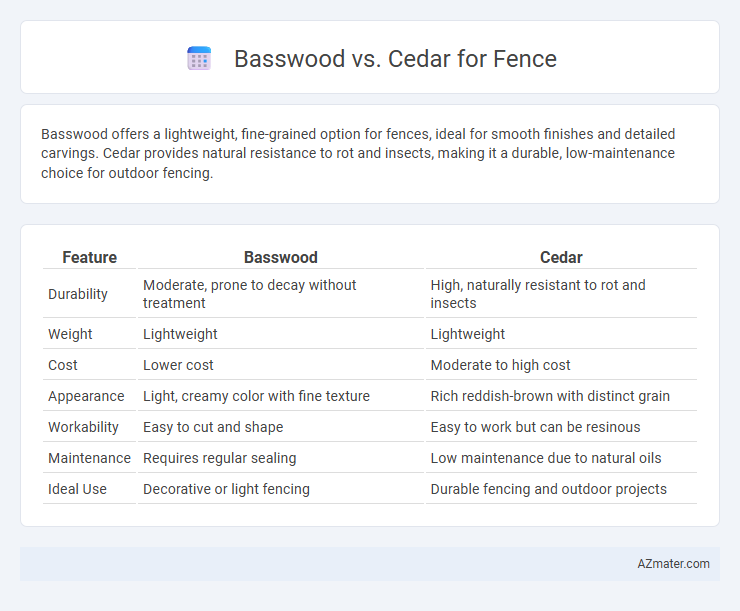Basswood offers a lightweight, fine-grained option for fences, ideal for smooth finishes and detailed carvings. Cedar provides natural resistance to rot and insects, making it a durable, low-maintenance choice for outdoor fencing.
Table of Comparison
| Feature | Basswood | Cedar |
|---|---|---|
| Durability | Moderate, prone to decay without treatment | High, naturally resistant to rot and insects |
| Weight | Lightweight | Lightweight |
| Cost | Lower cost | Moderate to high cost |
| Appearance | Light, creamy color with fine texture | Rich reddish-brown with distinct grain |
| Workability | Easy to cut and shape | Easy to work but can be resinous |
| Maintenance | Requires regular sealing | Low maintenance due to natural oils |
| Ideal Use | Decorative or light fencing | Durable fencing and outdoor projects |
Introduction: Comparing Basswood and Cedar for Fencing
Basswood and cedar are popular choices for fencing due to their durability and aesthetic appeal. Cedar naturally resists rot and insect damage, while basswood offers a smooth texture and is more affordable. Choosing between basswood and cedar depends on desired longevity, maintenance, and budget considerations.
Basswood Overview: Key Properties and Characteristics
Basswood is a lightweight hardwood known for its fine, even texture and pale color, making it ideal for decorative fencing and carving projects. Its moderate durability and resistance to decay are lower than cedar, requiring proper sealing or treatment to enhance lifespan in outdoor applications. Basswood's workability and smooth finish appeal to those seeking aesthetic appeal, but its maintenance needs must be balanced against cedar's natural rot resistance and insect repellency.
Cedar Overview: Key Properties and Characteristics
Cedar is highly valued for fencing due to its natural resistance to decay, insects, and moisture, making it a durable and low-maintenance option. Its fine, straight grain and aromatic properties also contribute to its aesthetic appeal and deter pests. Compared to basswood, cedar offers superior weather resistance and longevity, especially in outdoor environments exposed to varying climates.
Durability and Longevity of Basswood vs. Cedar
Basswood offers moderate durability but is more prone to rot and insect damage compared to cedar, making it less ideal for long-term outdoor use without treatment. Cedar naturally contains oils and resins that resist decay, insects, and weathering, providing superior longevity and minimal maintenance for fencing. Over time, cedar fences typically maintain structural integrity and appearance longer than basswood, which may require frequent sealing or replacement.
Resistance to Decay, Insects, and Weather
Basswood has moderate resistance to decay and insects but is less durable against harsh weather conditions compared to cedar. Cedar naturally contains oils and acids that offer superior resistance to decay, insect infestation, and moisture-related damage, making it ideal for outdoor fence longevity. When considering long-term durability and minimal maintenance, cedar outperforms basswood due to its enhanced natural protective properties.
Maintenance Requirements for Basswood and Cedar Fences
Basswood fences require regular sealing or staining to protect against moisture and prevent decay, as the wood is softer and more prone to damage. Cedar fences naturally resist rot, insects, and weathering due to their natural oils, reducing the frequency of maintenance needed. While cedar fences may need occasional cleaning and resealing, basswood demands more consistent upkeep to maintain durability and appearance.
Aesthetic Differences: Color, Grain, and Finish
Basswood fences showcase a pale, creamy color with subtle grain patterns that create a smooth, uniform appearance, ideal for a clean and modern aesthetic. Cedar fences feature rich, reddish-brown hues with pronounced, natural grain and knots that provide a warm, rustic charm and distinctive texture. Both woods accept stains and finishes well, but cedar's vibrant color deepens beautifully over time, while basswood maintains a light, neutral base perfect for custom paint or staining options.
Environmental Impact and Sustainability
Basswood and cedar both offer eco-friendly options for fencing, but cedar is generally more sustainable due to its natural resistance to decay and pests, reducing the need for chemical treatments. Basswood, being a fast-growing hardwood, supports reforestation efforts but often requires preservatives to enhance durability, which can impact environmental safety. Choosing cedar aligns better with long-term sustainability goals as it extends fence lifespan while minimizing chemical use.
Cost Comparison: Basswood Fences vs. Cedar Fences
Basswood fences generally cost less than cedar fences, making them a more budget-friendly option for large projects. Cedar's higher price is due to its natural resistance to rot, insects, and weather, which can reduce long-term maintenance expenses. Choosing between basswood and cedar often depends on initial budget constraints versus durability and lifespan considerations.
Conclusion: Which Wood is Better for Your Fence?
Basswood offers affordability and easy workability with a smooth finish, but it lacks natural resistance to decay and insects compared to cedar. Cedar provides superior durability, natural rot resistance, and insect repellence, making it ideal for long-lasting outdoor fences despite a higher price. For a durable, low-maintenance fence with enhanced weather resistance, cedar is the better choice over basswood.

Infographic: Basswood vs Cedar for Fence
 azmater.com
azmater.com